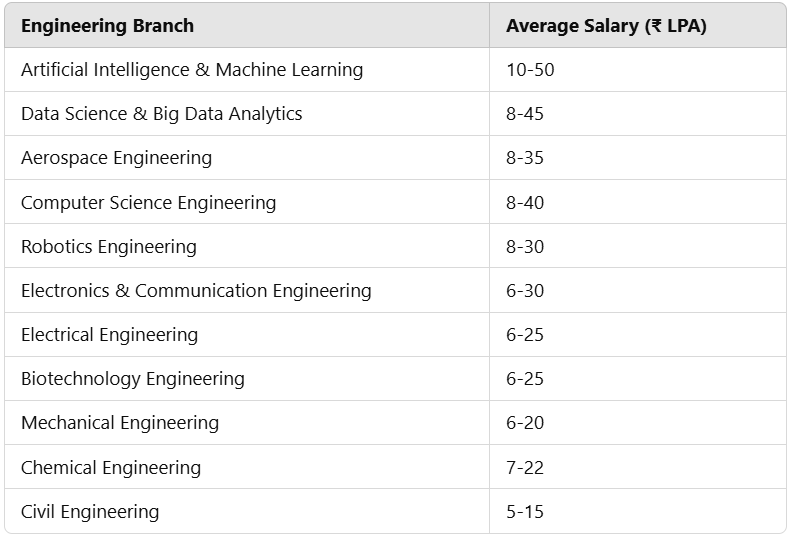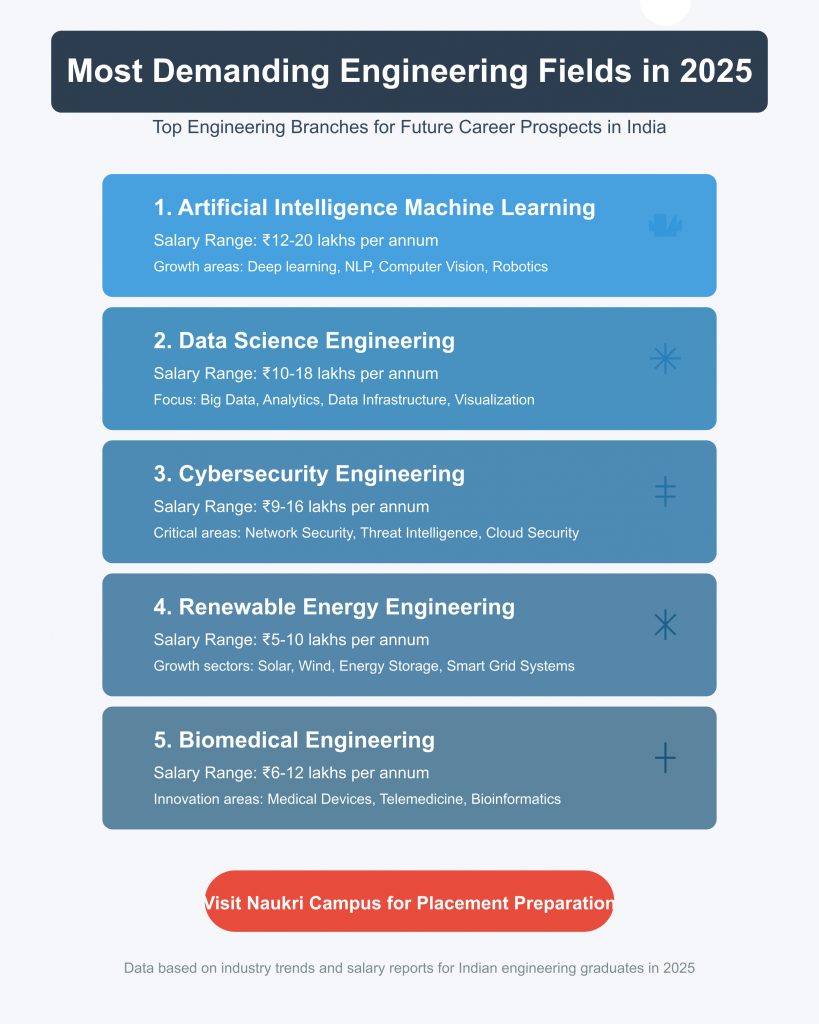Artificial Intelligence (AI) is revolutionizing industries across the globe. From automating routine tasks to enabling self-driving cars and intelligent healthcare diagnostics, AI is reshaping the future of work. For college…

Which Engineering Branch is Best for Future? – Answered!
Choosing the right engineering branch is critical to shaping your career and earning potential. With rapid technological advancements and emerging industry trends, students often ask, ‘Which engineering branch is best for the future?’. Choosing the right engineering branch is one of the most crucial decisions for students pursuing higher education, particularly in India, where engineering remains a highly sought-after career path.
This comprehensive guide aims to help college students and recent graduates navigate the complex landscape of engineering disciplines, focusing on future demand, salary potential, and career stability in 2025 and beyond.
List of Engineering Branches
Before diving into which branches offer the best prospects, let’s first understand the list of engineering branches commonly available to students:
- Computer Science and Engineering (CSE)
- Information Technology (IT)
- Electronics and Communication Engineering (ECE)
- Mechanical Engineering
- Civil Engineering
- Electrical Engineering
- Chemical Engineering
- Aerospace Engineering
- Biotechnology Engineering
- Petroleum Engineering
- Agricultural Engineering
- Mining Engineering
- Marine Engineering
- Industrial Engineering
- Metallurgical Engineering
- Textile Engineering
- Environmental Engineering
- Robotics and Automation Engineering
- Artificial Intelligence and Machine Learning
- Data Science and Engineering
This extensive range of options allows students to align their interests with specialized fields, but it also creates the challenge of determining which path will lead to the most promising future.
Most Demanding Engineering Fields in 2025
As technology continues to reshape industries globally, specific engineering disciplines have emerged as the most demanding engineering fields in 2025. These fields are experiencing rapid growth due to technological advancements, market demands, and global challenges.
Based on industry trends, the most demanding engineering fields include:
Computer Science Engineering (CSE)
- Introduction: CSE deals with software development, cybersecurity, cloud computing, and system architecture. It is the backbone of the IT industry, ensuring smooth digital transformations across sectors.
- Future Scope: The demand for software developers, cloud architects, and cybersecurity experts will continue to grow. Emerging fields such as blockchain and quantum computing will further expand opportunities.
Artificial Intelligence & Machine Learning (AI & ML)
- Introduction: AI & ML focus on creating intelligent systems to learn and adapt. These technologies power automation, recommendation engines, and self-driving cars.
- Future Scope: AI & ML will revolutionize industries like healthcare, finance, automation, and smart cities. Companies need AI engineers for deep learning, NLP, and robotics applications.
Data Science and Big Data Analytics
- Introduction: Data science involves extracting meaningful insights from large datasets using statistical methods, AI, and machine learning algorithms.
- Future Scope: The explosion of data-driven decision-making across industries will drive demand for data scientists, prominent data engineers, and business intelligence professionals.
Mechanical Engineering
- Introduction: One of the oldest fields, mechanical engineering focuses on designing, analyzing, and manufacturing mechanical systems and products.
- Future Scope: With advancements in Industry 4.0, mechanical engineers will work with IoT, AI-driven automation, and innovative manufacturing technologies.
Electrical Engineering
- Introduction: This field deals with power systems, electrical circuits, electronics, and control systems, which play a crucial role in industrial automation and power generation.
- Future Scope: The growth of renewable energy, electric vehicles, and smart grids will create new opportunities for electrical engineers.
Electronics & Communication Engineering (ECE)
- Introduction: ECE engineers work on electronic devices, embedded systems, and communication technologies like 5G and IoT.
- Future Scope: The rise of 5G networks, automation, and semiconductor advancements will boost telecom and consumer electronics job prospects.
Civil Engineering
- Introduction: Civil engineering focuses on infrastructure development, including bridges, roads, buildings, and thoughtful city planning.
- Future Scope: The demand for sustainable and innovative infrastructure projects is rising, ensuring steady job opportunities in government and private sectors.
Chemical Engineering
- Introduction: Chemical engineering involves producing and processing chemicals, pharmaceuticals, and materials.
- Future Scope: Industries like bioengineering, nanotechnology, and green energy are increasing the demand for chemical engineers worldwide.
Aerospace Engineering
- Introduction: This field covers aircraft, spacecraft, and defense technology design and development.
- Future Scope: With space exploration and private space travel gaining momentum, aerospace engineers will have exciting opportunities in ISRO, NASA, SpaceX, and defense research.
Biotechnology Engineering
- Introduction: Biotechnology integrates biology and engineering to create solutions for healthcare, agriculture, and environmental sustainability.
- Future Scope: The biotech industry is growing with advancements in genetic engineering, biopharmaceuticals, and sustainable biofuels.
Robotics Engineering
- Introduction: Robotics engineering focuses on designing, building, and programming robots for industries like healthcare, defense, and automation.
- Future Scope: With AI-driven automation expanding rapidly, robotics engineers will be in high demand for manufacturing, logistics, and medical robotics applications.
Which Branch of Engineering Has the Highest Salary?
Compensation is understandably a significant factor when choosing an engineering discipline. Here’s a breakdown of the top 11 highest-paying branches in engineering based on average starting salaries in India as of 2025:

It’s important to note that these figures represent starting salaries, and compensation increases significantly with experience, specialization, and location. Additionally, multinational companies often offer higher packages compared to domestic firms.
Detailed Analysis of the Best Engineering Branches for Future
While determining which engineering branch is best for prospects depends on multiple factors, including personal interests, aptitudes, and regional opportunities, specific fields demonstrate more substantial growth potential. Computer science, artificial intelligence, renewable energy, and biomedical engineering are promising disciplines for college students in 2025.
Now, let’s explore the detailed analysis of the best engineering branches for students:
Computer Science and AI Engineering
Computer Science continues to dominate the engineering landscape, particularly its evolution into specialized fields like AI, machine learning, and data science. The demand for CS engineers is expected to grow by 22% by 2030, significantly higher than the average for all occupations.
Key growth areas include:
- Artificial intelligence systems development
- Cloud computing infrastructure
- Quantum computing research
- Blockchain technology implementation
- Edge computing applications
Renewable Energy Engineering
With global commitments to reduce carbon emissions and transition to sustainable energy sources, renewable energy engineering presents excellent long-term prospects. India’s ambitious renewable energy targets create substantial opportunities for engineers specializing in:
- Solar photovoltaic system design
- Wind farm development
- Energy storage solutions
- Smart grid technologies
- Bioenergy systems
Biomedical and Biotechnology Engineering
The healthcare technology sector is experiencing rapid innovation, accelerated by recent global health challenges. Biomedical engineers are at the forefront of developing:
- Advanced medical devices
- Prosthetics and implants
- Telemedicine platforms
- Personalized medicine solutions
- Bioinformatics systems
Robotics and Automation Engineering
As industries increasingly automate processes to improve efficiency and reduce costs, robotics engineers are becoming indispensable. Key areas of growth include:
- Collaborative robots (cobots)
- Industrial automation systems
- Autonomous vehicles
- Drone technology
- Smart manufacturing solutions
Regional Considerations for Engineering Careers in India
The demand for specific engineering disciplines varies across different regions of India:
- North India (Delhi-NCR, Chandigarh): There is a strong demand for IT, electronics, and manufacturing engineers, particularly in the automotive and electronics industries.
- South India (Bangalore, Hyderabad, Chennai): Technology hub with exceptional opportunities for computer science, AI, and electronics engineers, especially in the thriving startup ecosystem.
- West India (Mumbai, Pune, Ahmedabad): There is a Significant demand for civil, mechanical, and chemical engineers due to manufacturing and infrastructure development.
- East India (Kolkata, Bhubaneswar): Growing opportunities in mining, metallurgy, and increasingly in IT and electronics sectors.
How to Choose the Most Demanding Engineering Branch in College?
Selecting the most demanding engineering branch in college requires careful consideration of multiple factors. Here’s a strategic approach to making this critical decision:
- Play to Your Interests and Strengths: Identify your natural aptitudes and interests. Are you fascinated by computers and programming? Do you enjoy building physical structures? Are you interested in environmental challenges? Aligning your engineering path with your interests increases the likelihood of long-term satisfaction and success.
- Research Industry Trends and Future Projections: Investigate which sectors are projected to grow over the next decade. Government reports, industry analyses, and employment forecasts can provide valuable insights into which engineering disciplines will remain in demand throughout your career.
- Consider Return on Investment: Engineering education requires significant financial investment. Compare the average starting salaries and career growth trajectories of different branches against the cost of education to determine the potential return on investment.
- Evaluate Work-Life Balance: Some engineering disciplines demand more rigorous work schedules or involve challenging work environments. Consider how different career paths align with your desired lifestyle and personal values.
- Explore Interdisciplinary Opportunities: Many of the most promising engineering roles involve cross-disciplinary knowledge. Fields like AI, robotics, and renewable energy often require a combination of skills from multiple engineering disciplines.
- Seek Guidance from Industry Professionals: Connect with practicing engineers through alumni networks, professional associations, or mentorship programs to gain firsthand insights into various engineering careers.
Engineering is a vast field with immense career opportunities. If you are wondering “which engineering branch is best for the future?”, consider upcoming industry trends, highest-paying fields, and your interests before deciding.
For placement preparation, job listings, and career guidance, explore Naukri Campus, your one-stop solution for engineering jobs and internships in India!
FAQs on Which Engineering Branch is Best for Future?
Is Computer Science the best engineering branch for the future?
Computer Science remains among the most promising engineering fields with exceptional growth in AI, machine learning, and cloud computing sectors, offering high salaries and diverse career paths globally.
Which engineering branch has the highest placement rates in India?
Computer Science, Data Science, and AI engineering consistently show the highest placement rates (90-95%) across Indian colleges, with MNCs actively recruiting graduates for technology roles.
Are traditional engineering branches like Mechanical becoming obsolete?
Traditional branches aren’t obsolete but are evolving. Mechanical engineering integrated with automation, robotics, and sustainable manufacturing remains relevant, with stable demand in the industrial sector.
What engineering specialization offers the best work-life balance?
Software engineering and IT-related fields generally offer better work-life balance with flexible hours, remote work options, and project-based schedules than site-based engineering roles.
Which engineering branch is best for entrepreneurship opportunities?
Computer Science, Electronics, and Renewable Energy engineering provide excellent foundations for startups, with lower initial capital requirements and scalable business models in the digital economy.
How does AI engineering compare to data science in terms of future prospects?
Both offer exceptional growth, but AI engineering focuses on building intelligent systems, while Data Science emphasizes analytics. AI currently commands slightly higher salaries with a projected 34% growth by 2030.
Which engineering branch has the best opportunities abroad?
Computer Science, Robotics, and Renewable Energy engineering graduates are most sought after internationally, with countries likethe USA, Germany, and Singapore offering specialized visa pathways.
Is Biomedical Engineering a good choice for the future job market?
Biomedical Engineering shows promising growth with the healthcare technology boom, offering diverse opportunities in medical devices, diagnostics, and pharmaceutical technology with 15% projected growth.
What engineering fields will benefit most from Industry 4.0?
Automation, Robotics, IoT, and Manufacturing Engineering will grow exponentially as Industry 4.0 transforms production systems through smart manufacturing and digital integration.
Which engineering branch offers the highest return on investment?
Computer Science and AI Engineering provide the highest ROI, with relatively lower education costs compared to starting salaries (₹10-20 lakhs) and accelerated career progression in technology sectors.
Latest Posts
Artificial Intelligence in 2025: Applications, Ethics, and Impact
In today’s rapidly evolving technological landscape, artificial intelligence (AI) stands at the forefront of innovation, reshaping industries and transforming the way we live and work. As college students and recent…
Best Internships For Students – Online and Summer Internships
In today’s competitive job market, internships are no longer just an extra activity; they have become a must-have for anyone looking to build a successful career. For college students and…
Python vs JavaScript: Which Language Should You Learn First?
Choosing the right programming language can shape your career in today’s competitive tech world. Two of the most popular languages among beginners and professionals are Python and JavaScript. If you’re…
AI Trends Transforming Tech and Businesses in 2025!
Artificial Intelligence (AI) is no longer just a futuristic concept, it’s shaping how we live, work, and think. For college students and freshers in India aspiring to build a career…
Popular Posts
Top 21 Highest Paying Jobs in India For Freshers
The Indian job market is evolving rapidly, with new opportunities emerging across various sectors. As a student or fresher, identifying the best career in India that aligns with your interests…
25+ Best Online Courses for Graduates in 2025 [Free & Certified]
In today’s competitive job market, earning a degree is just the beginning. To truly stand out, college students and freshers must constantly upskill, stay updated with industry trends, and gain…
Best CV Formats for Freshers: Simple, Professional & Job-Winning Templates
Creating an effective CV (Curriculum Vitae) is the first step towards landing your dream job or internship as a fresh graduate. Your CV is your initial introduction to potential employers…
Top Computer Science Jobs for Freshers in India
The rapid evolution of technology has created immense opportunities for fresh computer science graduates. With the IT sector expanding globally, India is one of the top countries offering lucrative and…
How to Answer – ‘What Are Your Strengths and Weaknesses?’
Landing your first job is a thrilling yet daunting experience. You’ve meticulously crafted your resume, researched the company, and prepped for potential questions. But there’s one question that throws even…



